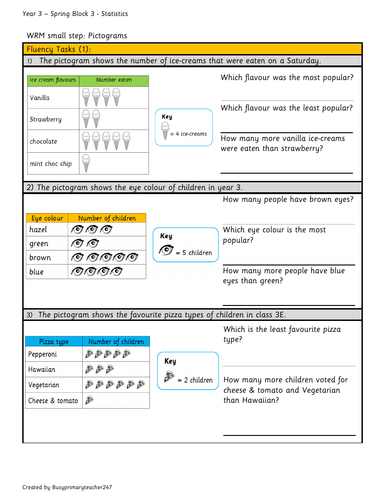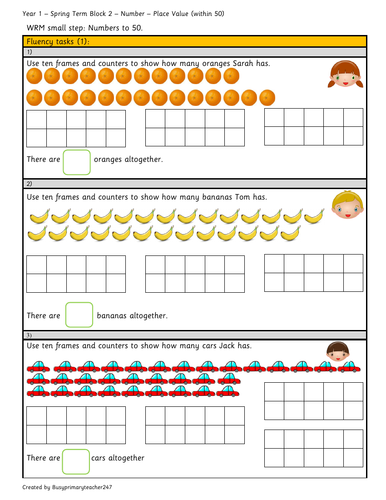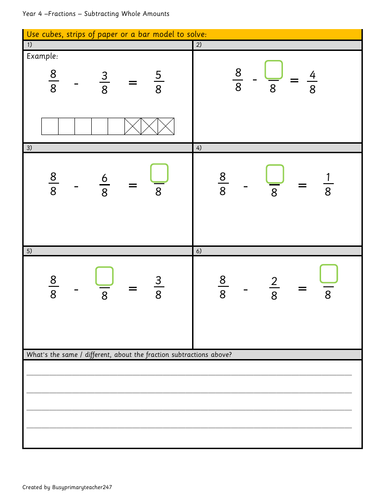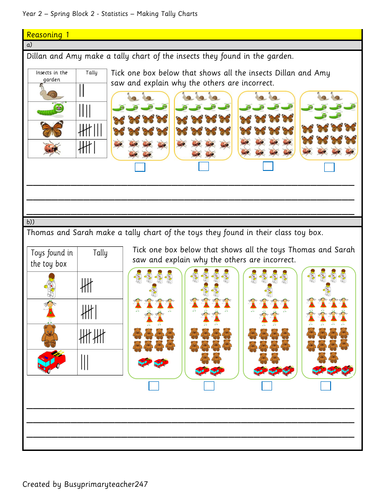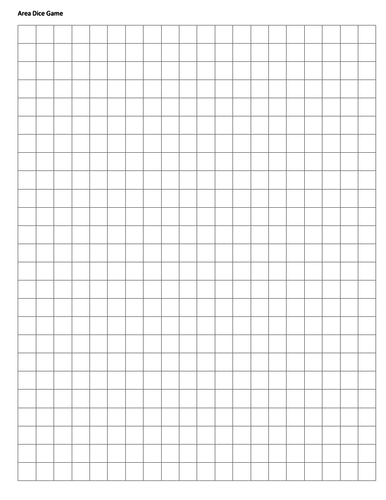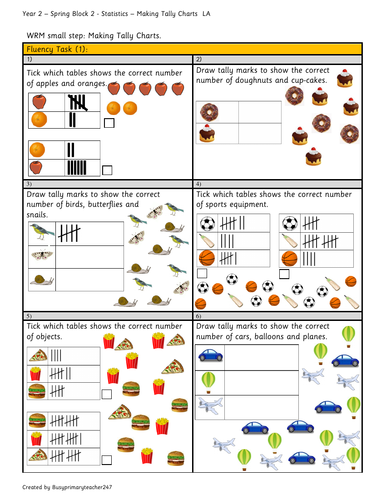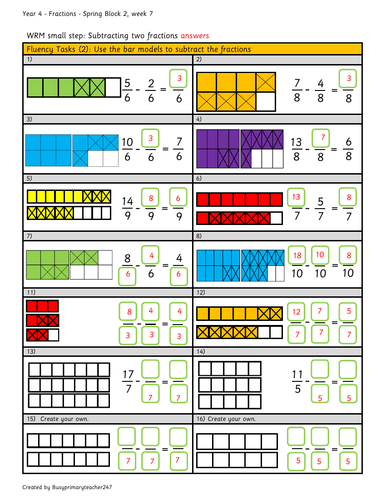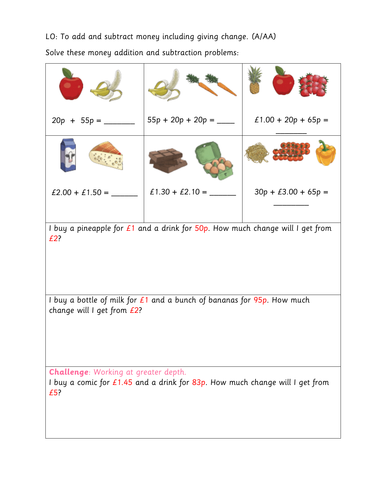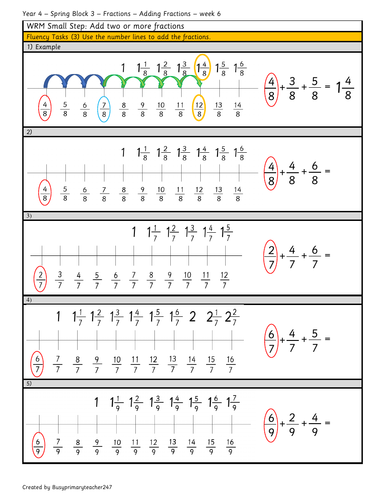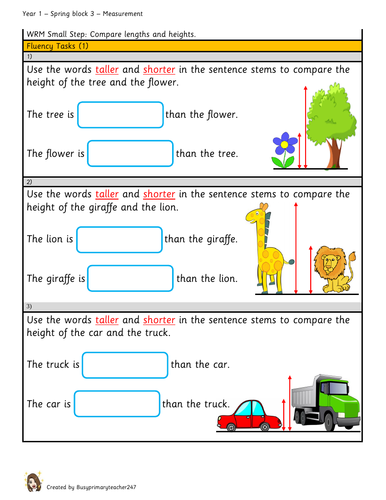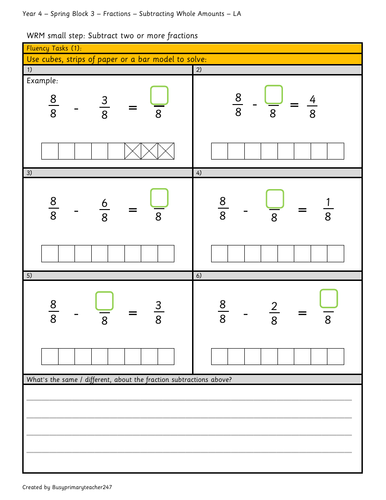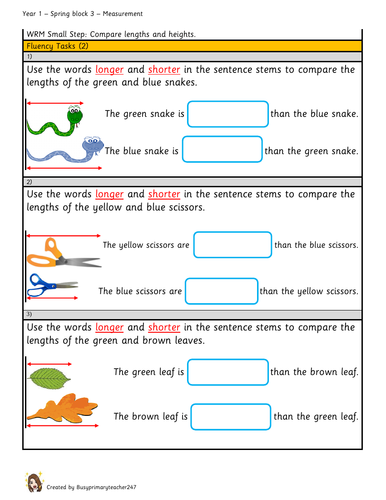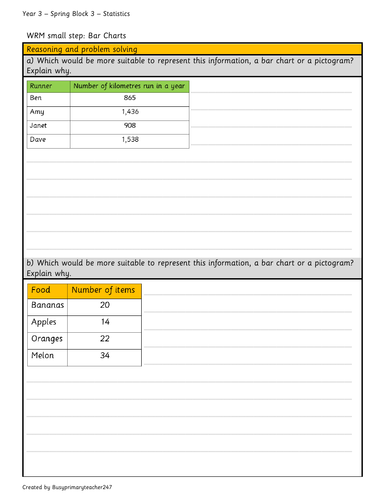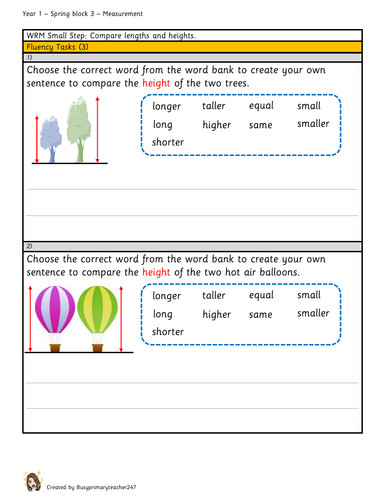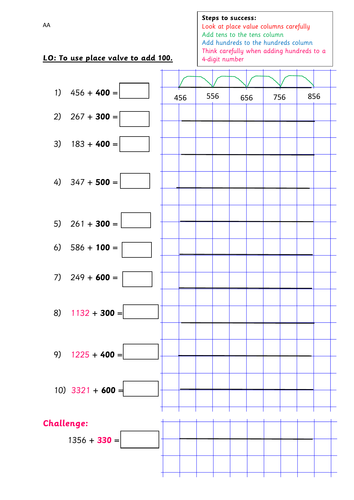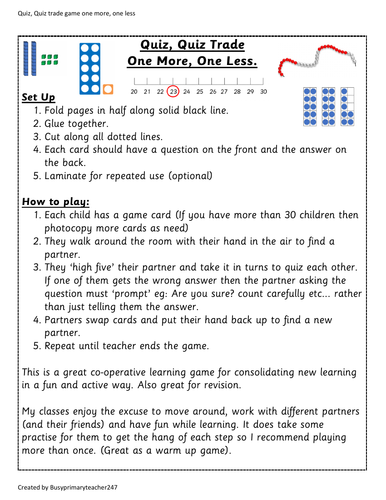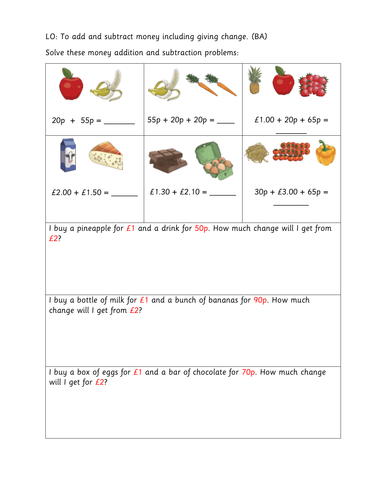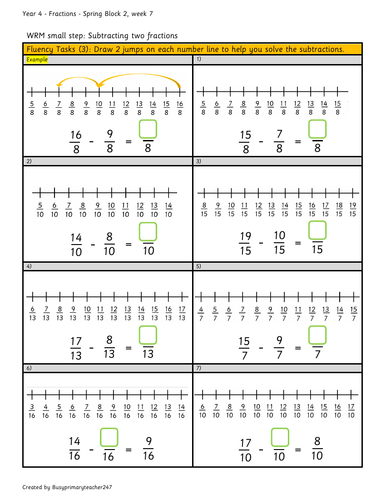132Uploads
174k+Views
66k+Downloads
All resources

Year 3 - interpreting pictograms (1)
This resources enables children to read and interpret information from pictograms, make comparisons and ask questions about data.
WRM Small Step: pictograms
Curriculum links:
-Interpret and present data using bar charts, pictograms and tables.
-Solve one-step and two-step questions [for example, ‘How many more?’ and ‘How many fewer?’ using information presented in scaled bar charts and pictograms and tables.
Enjoy!
Your feedback is always welcome x
Edited
Error on Q4 has been corrected.

Year 1 – Spring Block 2 – Number Place Value (Within 50) - week 5- numbers to 50
This resource follows the concrete-pictorial-abstract approach to Maths Mastery and also includes reasoning questions. It is linked to WRM small steps: Numbers to 50.
Curriculum links:
- Count to 50 forwards and backwards, beginning with 0 or 1, or from any number.
- Count, read and write numbers to 50 in numerals.
- Identify and represent numbers using objects and pictorial representations including the number line, and use the language of: equal to, more than, less than (fewer), most, least.
I hope you find this resource useful,
Your feedback is always welcome :)

Year 4 - Subtracting fractions
This resource uses a concrete – pictorial – abstract approach to help children gain fluency and mastery.
Curriculum links:
Solve problems involving increasingly harder fractions to calculate quantities, and fractions to divide quantities, including non-unit fractions where the answer is a whole number.
Add and subtract fractions with the same denominator.
Your feedback is always welcome x

Year 2 - Spring block 2 - week 3 - Statistics - Making tally charts (reasoning)
Here is a free taster of 2 reasoning question pages that link to WRM Maths Spring block 2 - Statistics.
Links directly to small step - Making tally charts

Area Dice Game
This is a great game for 1-2 players.
Equipment
-squared paper
-2 dice
-coloured pencils/ felt tips (textas)
Instructions
- Each player chooses a different coloured pencil / felt tip
- Players take it in turns to roll the dice.
- They use the number on each dice to colour in the number of squares, and write the area in the
middle of the shape.eg
- Game ends when players run out of room to draw.
- Winner is the player who has used the largest area/most squares.

Year 2 - WRM Spring Block 2 - week 3 - Making Tally Charts Fluency 1
Here is a free taster of the first fluency question page that links to WRM Maths Spring block 2 - Statistics. It is differentiated 2 ways.
Links directly to small step - Making tally charts
Enjoy x

Subtracting 2 fractions (2)
This resource supports Year 4 WRM small step ‘Subtracting two fractions’, with varied fluency 2 questions. It follows a concrete – pictorial – abstract approach.
It includes differentiated worksheets and answers.
Curriculum links
• Solve problems involving increasingly harder fractions to calculate quantities, and fractions to divide quantities, including non-unit fractions where the answer is a whole number.
• Add and subtract fractions with the same denominator.
I hope you find this resource useful x

Year 3 - To add and subtract money including giving change
Worksheet focusing on adding and subtracting money.
Matches Rising Star's Objective: To add and subtract money including giving change.
Includes working at greater depth question

Year 4 Count in fractions
This resource links to the WRM Spring block 3 Fractions unit and focuses on adding fractions with the same denominator. As requested, I have included more fluency and reasoning questions.
National curriculum links:
Solve problems involving increasingly harder fractions to calculate quantities, and fractions to divide quantities, including non-unit fractions where the answer is a whole number.
Add and subtract fractions with the same denominator.
Enjoy x

Year 1 - Measurement - Comparing Heights
This resource supports Year 1 Measurment - Comparing heights. Children compare heights of a variety of objects using the vocabulary ‘taller’ and ‘shorter’. Answers are included in the
PDF.
Curriculum links
Compare, describe and solve practical problems for: lengths and heights (for example, long/short, longer/shorter, tall/short.
Enjoy x
All images used in this resource are from

Year 4 - Subtracting from whole amounts (fractions)
This resource supports WRM Year 4 Spring block 3, Number – Fractions. Small Step: Subtracting from whole amounts. It also links to Fluency task 1.
It uses a concrete – pictorial – abstract approach to help children gain fluency and mastery. It is differentiated 2 ways and includes answers.
Curriculum links:
Solve problems involving increasingly harder fractions to calculate quantities, and fractions to divide quantities, including non-unit fractions where the answer is a whole number.
Add and subtract fractions with the same denominator.
Your feedback is always welcome x

Year 1 - Measurement - Comparing lengths (varied fluency 2)
This resource supports Year 1 Measurment - Comparing length and heights. Children compare lengths of a variety of objects using the vocabulary ‘longer’ and ‘shorter’. (Varied fluency 2). Answers are included in the PDF.
Curriculum links
Compare, describe and solve practical problems for: lengths and heights (for example, long/short, longer/shorter, tall/short.
Enjoy x
All images used in this resource are from

Year 3 statistics reasoning and problem solving
Reasoning and problem solving questions supporting WRM Small step - Bar Charts.

Year 1 comparing length and height (Varied fluency 3)
This resource supports WRM Year 1 Spring block 3 Measurement comparing length and height (Fluency task 3).
Children write sentences to compare length and height using key vocabulary - taller, longer, shorter, smaller, bigger, equal, same etc…

Year 3 adding multiples of 100 to 3-digit numbers using a numberline
Worksheet based on adding multiples of 100 to 3-digit numbers using jumps on a number line. Includes a challenge 4-digit number question.

Quiz, Quiz, Trade Cooperative Learning activity based on finding one more and one less (up to 50)
This is a fun and engaging way for children to learn about finding one more and one less (using numbers up to 50) through a cooperative learning activity called Quiz, Quiz, Trade.
This activity can be used as a warm-up or plenary and doesn't require too much preparation (If you choose to laminate it you can use it multiple times).
Enjoy x
Instructions are included in the resource.

Year 3 - To add and subtract money including giving change (LA)
Worksheet focusing on adding and subtracting money including giving change. Aimed at children 'working towards' age related (BA)
Links with Rising Star's objective: To add and subtract money including giving change

Subtracting two fractions (3) using a number line
This resource supports Year 4 WRM small step ‘Subtracting two fractions’, and focuses on using a number line for varied fluency 3 questions. It follows a concrete – pictorial – abstract approach.
It includes differentiated worksheets and answers.
Curriculum links
• Solve problems involving increasingly harder fractions to calculate quantities, and fractions to divide quantities, including non-unit fractions where the answer is a whole number.
• Add and subtract fractions with the same denominator.
I hope you find this resource useful x

Year 3 Maths Warm Up - QR Code Scavenger Hunt 2
A fun way to start any maths lesson and a great way to include technology. This activity is designed to be used with I Pads (Or a similar device with a QR code reader).
Steps:
- Print off and cut out each code.
- Place QR codes around the classroom.
- Children work individually (or in groups depending on available devices) and move around the room solving each problem in order.
- There is also a secret code at the end , so that you know they have completed the hunt.
Answer sheet included.
Enjoy! Your feedback is always welcome x

Year 3 Maths Warm Up - QR Code Scavenger Hunt 1
A fun way to start any maths lesson and a great way to include technology. This activity is designed to be used with I Pads (Or a similar device with a QR code reader).
Steps:
- Print off and cut out each code.
- Place QR codes around the classroom.
- Children work individually (or in groups depending on available devices) and move around the room solving each problem in order.
- There is also a secret code at the end , so that you know they have completed the hunt.
Answer sheet included.
Enjoy! Your feedback is always welcome x

